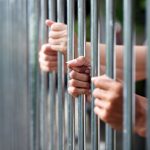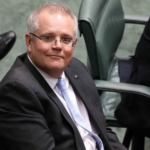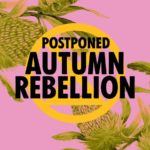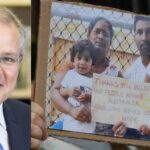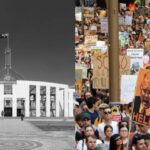Victoria Police Provoke Protest to Facilitate Harsher Laws, Says Renegade Solidarity Audio Force
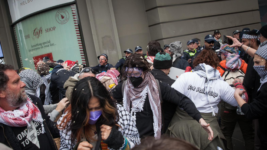
This weekend marks the 38th week of the Free Palestine protests being held across the nation. And by all accounts, except for the disinformation being peddled by untrustworthy major party politicians, these events have been peaceful, harmonious and family-friendly.
The weekly protest in Naarm-Melbourne and here on Gadigal land in Sydney have been stunning in terms of the huge numbers involved and the determination of participants to keep on showing up to demand a ceasefire and to see an end to the genocide.
Of course, that grassroots people have been compelled in this manner is no surprise when taking into consideration the genocidal mass killing and starvation project Israel has now been perpetrating upon the Palestinians within the walled-in region of the Gaza Strip for ten months.
But despite government and compliant media attempting to deny the genocide is taking place, this has been foiled by livestreaming and Al Jazeera.
And the longer the worst atrocity crime since World War II has gone on, the more blatantly obvious has become the complicity of the Albanese government and the nation of Australia, in general.
So, hence the recent turning up of the volume on the demonisation of the pro-Palestinian protests, and the accompanying and truly idiotic charges of antisemitism against them, as the government is trying to shift the narrative from its complicity in the killing of tens of thousands of people.
And it’s been in Naarm, the centre of the continent’s most ardent protest actions, that this turning upon concerned civilians has been most apparent, as it commenced three weeks ago, when Victoria police officers assaulted a bunch of unarmed peaceful protesters, including kids, with OC spray.
The coming crackdown on protest
Many have at least seen footage online of the speakers at the Naarm rallies, such Nasser Mashni, Gary Foley, Uncle Robbie Thorpe and Tasnim Sammak addressing the crowd from a truck, that acts as a stage, with a Palestinian flag and an Aboriginal flag hanging behind them as a backdrop.
And prior to the pepper spraying of some kids and some elderly protesters in the face, Victoria police officers had initially turned their newfound ire upon the truck, as after 35 weeks of it having been parked out the front of the State Library, suddenly law enforcement didn’t want it there anymore.
The truck belongs to the Renegade Solidarity Audio Force, a collaboration between Renegade Activists and Solidarity Sound System, which has been providing “the sounds, staging and logistics for actions and rallies” since 2017. And it’s a “dedicated protest sound system” that’s voluntary.
And according to RSAF, the attention its garnered from the law, as well as the targeting of the weekly protest movement in Naarm, appears not only an attempt to hide government complicity in Gaza, but it’s also likely Victorian authorities are attempting to establish a new antiprotest regime.
Sydney Criminal Lawyers spoke to Renegade Solidarity Audio Force’s Mercedes Zanker and Jacob Grech about the recent crackdown on the protests, the reasons why they consider there’s a broader agenda at play and how human rights protections are valuable, even if they’re not infallible.
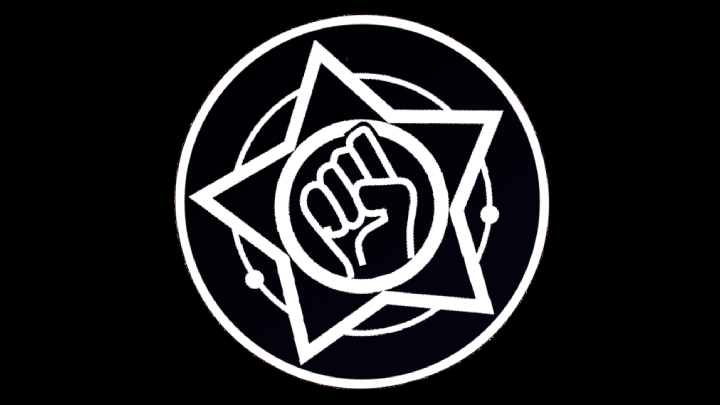
The pro-Palestinians protests in Naarm and here on Gadigal land are coming up to their 38th week. And by all accounts, these have been peaceful, diverse and welcoming events.
However, over the last couple of weeks, there have been reports about Victoria police all of a sudden starting to apply excessive force and overreach towards the peaceful protests.
The police approach first started escalating on Sunday 9 June, after the major parties condemned the protests as antisemitic and tried to insist that Greens leader Adam Bandt is the chief instigator of the actions.
So, how did it come to pass that on 9 June some of the protest marchers were suddenly set upon by Victoria police using OC Spray? And what sort of impact has it had on the weekly protest movement?
Mercedes: On 9 June, the police tried to shift the goalposts in terms of where we set up the sound system.
This was after 35 weeks of rallies that had taken place without incident. We’d been providing sound for up to 70 to 80,000 people.
On that day, the police started pepper spraying. There were children pepper sprayed. There were older members of the community pepper sprayed. And that really set the tone of the protest.
These protests have been family-orientated. They’re really important to the community. There is a genocide happening, so it is an opportunity for everyone to get together in solidarity, and the community gets to see one another.
So, when the event was met with state violence, with the pepper spraying, it was an attempt to cast these protests, and us and our communities, as violent or that the protests are escalating to violence, which is not the case.
These protests had gone on without any incident for 35 weeks and then the cops just unleashed this pepper spray and pepper sprayed children.
Jacob: The change on the day was palpable. At the start of the protests, Victoria police, obviously getting the direction from above, were being helpful.
In fact, I’ve never been in a situation before when the police have been so helpful in facilitating a protest.
They advocated with Melbourne City Council on our behalf. They advocated with the State Library on our behalf.
They directed us not to worry about no righthand turns and one way streets when getting our truck in and out of the rallies as quickly as possible.
Their orders were obviously to facilitate the protest at that time. The political reason for that, I don’t know.
But then all of a sudden, the police started introducing themselves, not as Frank, but as chief inspector-in-charge of the event. It was like the flick of a switch.
They went from facilitating the protest, to being the enemy.
And as you said, it came at the same time as various parliaments began condemning the protests, and the universities were moving to evict peaceful campers on lawns.
So, it was obvious that the direction had come from above.
The language the police used was “the discretion they had afforded us is no longer available”. So, that says it’s come from above.
So, did it come across like the police were out to punish protesters over the claims that senior politicians had been making about them?
Mercedes: It’s hard to try and gauge, but one potential reading is that, casting the protest from above as violent or as antisemitic, as you say, it is a roundabout way of the state trying to justify increased repression by garnering public support for it.
So, they’re reframing this at the same time that there’s been increased scrutiny on the Labor government’s complicity in the genocide in regard to weapons manufacturing deals, its ongoing support and its absolute total inaction.
So, in shifting the narrative onto the protesters and their actions, it’s actually an attempt to obscure the violence and to reaffirm the actions of the state.
So, on the same day, Victoria police assaulted people with pepper spray, it also attempted to ban the sound system truck you’ve been supplying for the antigenocide protests. And this culminated in officers issuing you with a move on order.
So, were Victoria police successful in disrupting the protest by doing that?
Jacob: Yes. They disrupted the protest. But they didn’t stop the protest from happening.
When I say disrupt, what they did is they turned the protest from a well organised public rally into something which had the potential to be unsafe and cause injuries.
The protesters were good though.
But because we couldn’t put the truck where we normally do, we couldn’t cordon off an area for those with wheelchairs who usually attend the protest.
We couldn’t have a separate stage for the Auslan interpreters, who provide signage for the deaf community.
And behind the truck is usually where we distribute water on hot days and the frontline medics are positioned.
So, what the police did was turn the protest into something which was potentially unsafe, not just to us and not just to rally participants, but to Victoria police themselves.
And you’re saying, it was the Victoria police that seemed to purposefully change the atmosphere of the protest from a safe community event into something potentially more volatile?
Mercedes: Absolutely. And I’d add that as the truck was stopped in the middle of an intersection, it actually made the protest more disruptive.
But I understand that last week, Victoria police took matters one step further than the fortnight prior, when they forced the truck to stop on Swanston Street instead.
So, what effect did this have? And taken together with what happened a fortnight earlier, what do you consider is developing here?
Jacob: The police have told us directly that the discretion they had previously allowed us had been removed, and they also said that these measures were being brought into place not just for the Palestine protests but for all protests in Melbourne.
So, what’s developing with the police here in the state of Victoria, they’re lobbying to have harsher protest laws introduced and to have a requirement for a permit system for protests and basically, to ban protests without authorisation.
So, what’s developing in the short-term, it seems to me, is the police are going to try to create a situation where ordered rallies turn into maximum chaos on the streets of Melbourne, which would then force the hand of the parliament of Victoria to introduce harsher protest laws.
That is what I see the gameplay is right now.
So, you’re talking about the type of system, like in Sydney, where you have to go to the police, fill out a form that stipulates what is going to happen, which the NSW police can then challenge if they decide to.
That’s right. We don’t do that in Melbourne.
But as you’d be aware, for the past few years in Sydney, since early 2022, we’ve got this harsher antiprotest regime, where the unauthorised blocking of a major road, major facility, a tunnel or a bridge, can result in up to two years prison and draconian fines.
I do know that later that same year, Victoria did enact similar draconian laws, but they were in regard to forest protesting.
So, do you foresee that those sorts of penalties are going to be applied to street protests in Victoria?
Jacob: We do have a whole lot of repressive laws. However, in the state of Victoria, we have something that NSW doesn’t have, and that is the Victorian Charter of Human Rights, and embedded in that charter is the right of people to assemble to express their political views.
So, that is basically the right to protest. And the Victorian Charter of Human Rights stipulates that any future laws can only be enacted taking into account the provisions of the charter, and any existing law has to be imposed in line with the provisions of the charter.
So, with the Victorian Charter of Human Rights and Responsibilities containing that right, it’s been our position up until now, and the police and the courts and the government have agreed, that it overrides things like blocking a laneway during a protest, because it is the right of people to assemble for political purposes.
What’s happening now is a conflict is occurring between various traffic laws and city ordinances and the Victorian Charter.
So, the charter of rights was enacted around 2006, have you noticed that it’s been positively impacting?
Jacob: Yes.
So, how has it been impacting?
Mercedes: In terms of protest rights, the charter comes into play in these instances that we’re discussing. The efficacy isn’t really known until it is pushed.
That framework exists and it works as a backup for when there is increased state repression, or they take action that impinges on rights.
So, it’s quite a poignant moment to see how the right to protest will work, as we have seen, over the last couple of weeks, how the police and the state have been acting.
The police have been taking on a political role over recent weeks. There has been a shift.
The police are said to be there to ensure public safety, but instead, they’re acting in a political role in trying to shut down these protests, and that order has come from the top.
So, it’s a waiting game now. As they’re pushing against protest, we now have to point to the Charter of Human Rights and, as they’re increasing the pressure, we have to hope that our right to assembly in the charter is protected by it.
This includes protecting aspects of the protest like the sound system and that protesters with disabilities will be able to attend those protests safely without discrimination.
Jacob: Section 16 of the charter is basically the right to protest, and to my knowledge, it has never been tested in court.
But certainly, on the ground from a protest organiser’s perspective, I’m aware that when we have some disagreement about what’s able to be done and what isn’t able to be done with Victoria police or various councils and institutions, we have pointed to our rights in the charter, and it has shut the conversation down.
And I think they’re now ready to challenge how far this right goes.
Just as you’ve been mentioning the right to protest being protected in Victoria and how it has been raised, it’s occurred to me that if in NSW, we did have that right protected, the process in which the NSW government rammed this draconian protest regime through in about 48 hours, might have been more difficult if we did have such a protection on the books.
Jacob: Exactly. It would have been very difficult.
Mercedes: There are certain council municipalities in Victoria, like Dandenong and Kingston, where barriers have been put in place to the right to peaceful assembly, such as needing a requirement to protest and requiring road and traffic controllers.
These barriers are now being put in place, and the grassroots movement is run off the smell of an oily rag financially, so putting these blocks and barriers in place, it then creates a financial barrier to that right to assembly as well, by requiring these measures in municipalities, like Dandenong and Kingston.
So, there are places where a permit system is already operating, but in the city of Melbourne, it’s not.
Jacob: We do have to apply for a permit to have an event in Victoria. Those permits take six weeks, generally. And our argument has always been that as a protest, we fall outside the need for events permits.
We actually got to a situation once for another campaign where the police were insisting, we weren’t a protest, but we were an event.
We said, “No. We are a protest.” They said, “What are you protesting?” And we said, “We’re protesting the Victoria police’s temerity to tell us what constitutes a protest.”
So, a protest is outside of an event.
But now you’re saying that over the last couple of weeks it appears that Victorian authorities are attempting to push against protest like they did in Sydney, but because you’ve got rights down there, it’s going to be a more difficult process for them?
Jacob: That’s right. But we don’t believe the Charter of Human Rights is bulletproof.
You only need to look at the United States and see all the good its bill of rights does in the US for the right to protest and for rights for minority people.
But the charter is a buffer, and we have been using it in that way. But now we’re anticipating a challenge to the human rights charter.
Mercedes: And it’s important to note that this push towards potential antiprotest laws, alongside the media casting the protesters as violent to garner public support for the new laws, aren’t seen in isolation from the heightened campaigns going on and organising around the arms trade.
So, it’s not just the attack on Sunday rallies, it is what this is going to allow in order to attempt to punish protesters in the future.
This is not just an attack on the Sunday rallies, it’s an attack on all future protests and tactics that are seen to be exposing government complicity in Gaza.
And in now moving towards this crackdown, they are absolutely trying to hide and deny their complicity in Gaza, and in doing this they’re attempting to shift the public’s focus onto the protesters, rather than where our focus should be.
Our focus should be on the multiple genocides that are occurring in this country, in Palestine, in the Congo, in the Western Sahara and all of these atrocities the arms trade is feeding into.
As the movement against the arms trade and exposing government complicity is rising, this shifting of the narrative onto us as the problem, is definitely being used to attempt to obscure government complicity in the arms trade and Gaza.



